As many analysts have recently written, the rules-based international order is under threat. The post-World War II system needs to be reformed to better address today’s global challenges; global multilateralism and overarching institutions need to be defended in the face of shifts towards bilateralism; alliances need to be re-thought in some cases and bolstered in others.
In the meantime, an unlikely self-declared savior has emerged: Turkish President Recep Tayyip Erdoğan. At the United Nations General Assembly last month and in a recent op-ed, he enthusiastically defended free trade, multilateralism, and the international liberal order.
But Turkey’s recent record doesn’t match this new rhetoric: Erdoğan has been seeking alternative alliances away from the West as part of a decade-old “axis shift,” has sought “precious loneliness” (from what it deems “immoral” world actors), and has lamented the concentration of power in the U.N. Security Council (“the world is bigger than five”). Meanwhile, Turkey has been drifting away from liberal democratic norms: For the first time since it began the “Freedom in the World” report in 1999, Freedom House classified the country as “not free” in 2018.
In fact, recent conciliatory messages from Erdoğan—via the op-ed, his U.N. speech, and his attempts last month to charm Germany, in particular—reflect concern about the country’s growing economic woes. Despite Erdoğan’s ideological resistance to the principles of liberal order, he knows that the solutions to his country’s economic troubles lie in that very order.
The rise and fall of the Turkish economic success
Turkey’s memories from the previous decade—when it thrived via increased commitments to the liberal economic order—must be fresh. Not long ago, Turkey was the rising star among developing countries, close to making the leap towards high-income status. Institutional and macro-economic reforms following the 2001 economic crisis, democratization efforts with the help of EU membership talks in 2005, and regulatory liberalization to align with EU standards reinforced the country’s integration into the global economic order. According to IMF figures, Turkey’s annual average economic growth between 2002 and 2015 was 5.9 percent, surpassing other emerging markets such as Brazil (3 percent), Argentina (3.5 percent), South Africa (3.1 percent), and Russia (3.8 percent). Thanks to the policy of quantitative easing in advanced economies and investment funds that poured into developing countries, Turkey became a darling of international investors. Between 2002 and 2015, the country’s external assets soared by a staggering rate of 239.5 percent, easing access to credit and thereby fueling growth. Total foreign direct investment (FDI) stock in Turkey reached $133 billion in 2017—10 times its 2002 level.
Turkey-EU customs union in particular, helped Turkey to further liberalize and expand its foreign trade with the rest of the world as well. Membership to NATO, the G-20, the World Trade Organization, and other connections with the trans-Atlantic alliance became key components of Turkey’s rising soft power in the early 2000s. Turkey experienced the benefits of the liberal order.
Yet those are the days of a nostalgic fairy tale. Today, the word “regression” is often used to describe the decaying economic and democratic norms in Turkey. As the world-renowned economist Daron Acemoğlu has astutely pointed out, institutional erosion and regulatory degeneration lie at the root of Turkey’s current problems. Rising cronyism and a lack of accountability are problems with deep roots. Among investors’ main concerns are the independence of the Central Bank, the innumerable amendments in government procurement law, President Erdoğan’s appointment of himself as the head of the country’s sovereign wealth fund, and his appointment of his son-in-law (also the minister of treasury and finance) as his deputy at the fund’s board. These developments have in turn factored into Turkey’s rising risk premiums and diminishing credit ratings.
Meanwhile, the government avoids responsibility and overlooks Turkey’s own economic mismanagement, instead blaming foreign powers for waging an “economic war,” which was claimed as the cause of the most recent currency crisis. But in fact, Turkey’s economic wounds are self-inflicted. The spat in August, when Washington issued sanctions on two Turkish ministers, only detonated a ticking time bomb. Reckless international borrowing—despite the May 2013 tapering message that signaled deteriorating credit conditions for emerging markets—and over-heating the economy at the expense of macro-economic balances led to soaring inflation and current account deficit. The country’s exposure to exchange rate risks due to the private sector’s outstanding debt in foreign currency also set Turkey on a troubled economic trajectory and is the real cause for the recent downturn. Against this backdrop, telling Turks “we have our God” is hardly reassuring—nor is the “native and national” narrative to justify turning inward, which has wiped out investor confidence.
President Trump’s measures have poured gas on the fire. His decision to sanction the two ministers—made in an effort to appease his Evangelical base over the Pastor Brunson detention—triggered a run on the Turkish currency that played directly into the “economic war” narrative. Furthermore, sanctions on the grounds of “human rights abuses” by an administration that separates immigrant children from their families at the border and puts them in detention centers appears out of place, strengthening Erdoğan’s hand. Yet it was the incomprehensible decision to double steel and aluminum tariffs on Turkey on “national security” grounds that most clearly enhanced the credibility of the “economic war” line. (Turkey’s share of imports into the United States stands at a mere 4.2 percent on steel and 0.3 percent on aluminum in 2017.)
Are Turkey’s alternatives viable?
Given Turkey’s problematic relations with the EU—its largest trading partner— and the United States, it is no wonder Turkey threatened to seek alternative alliances. Yet, it is difficult to see how Turkey’s prospective alternative allies can provide the economic relief Ankara needs.
China, Russia, and Qatar together absorbed only 4 percent of Turkish exports in 2017, and their investments only account for 1.1 percent of total FDI in Turkey. Furthermore, as the chart below indicates, in 2017, Turkish exports’ coverage rate of imports with the EU and the United States are 86.7 percent and 72.4 percent respectively. This indicates a relatively balanced trade relationship given the country’s overall export/import coverage ratio at 67.1 percent.
In trade with Russia and China, however, Turkey is a net importer, as its exports cover merely 14 percent and 12.6 percent of imports from these countries. Trade with Qatar, on the other hand, is rather negligible with a small surplus of $385 million—compared to the $1.9 billion surplus with Israel, for instance. Qatar’s recent investment pledge of $15 billion and China’s project finance promise of $3.6 billion fall considerably short of the sums Turkey will require, especially with its private sector debt of $295 billion in foreign loans.
Erdoğan’s call to uphold the liberal international order is only as convincing as Chinese President Xi Jinping’s call to preserve globalization in Davos last year. Given the economic realities that Turkey is facing and the country’s track record on economic and democratic backsliding, President Erdoğan’s embrace of the liberal order sounds more like trying to save the day than a sincere commitment. Praising the liberal order while also announcing that “democracy is not possible” with media freedom indicates that his understanding of democracy is not liberal at all.
So, is Turkey really returning to the liberal order?
The rules-based international order is under duress, yet in spite of all the anger and resentment, Turkey has benefitted greatly from this order. Could Erdoğan’s recent op-ed and U.N. General Assembly speech—in which he expressed support for an open trading system and the international liberal order—be a belated acknowledgement of this reality? Is it a recognition that Turkey did indeed flourish due to its membership in the global multilateral system and its commitment to the liberal economic order?
If yes, then the advocates of the international liberal order must welcome an old ally back to the fold. However, the litmus test will be if Erdoğan puts his words into action and revives Turkey’s independent regulatory institutions, re-instates the rule of law, and expands democratic governance. Otherwise, it is very difficult to see how he will overcome the irony of maintaining an illiberal rule at home while advocating for a liberal one internationally.
The Brookings Institution is committed to quality, independence, and impact.
We are supported by a diverse array of funders. In line with our values and policies, each Brookings publication represents the sole views of its author(s).

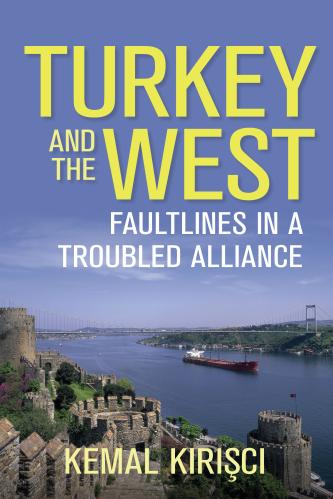
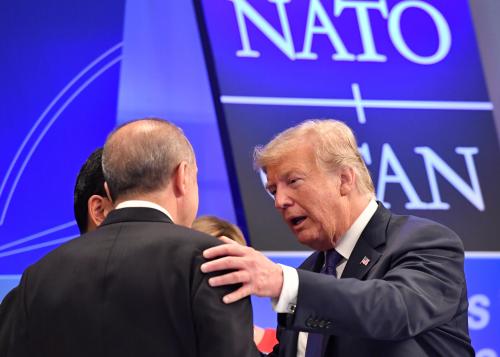
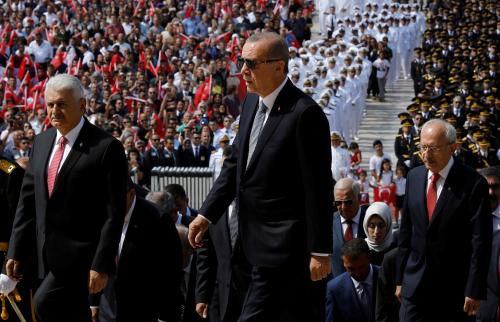

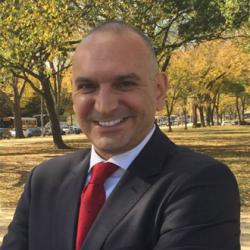

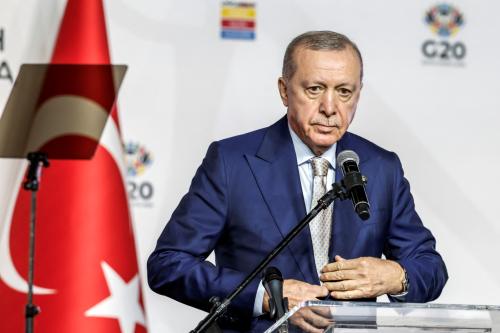

Commentary
What’s behind Erdoğan’s apparent support for the liberal international order?
October 9, 2018